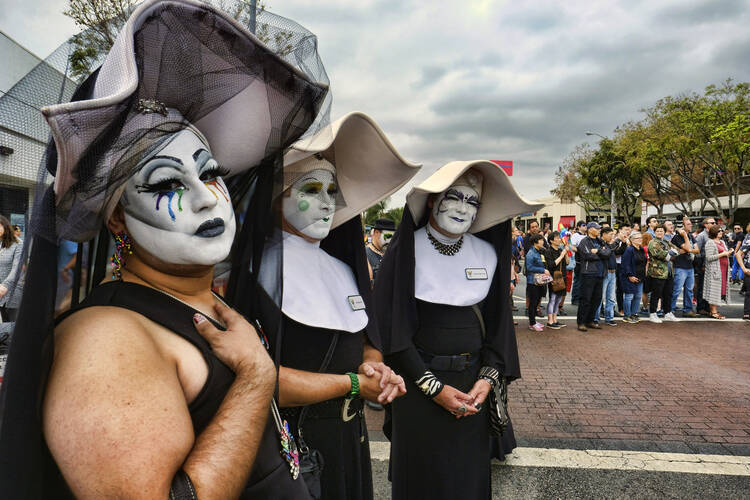News that the Los Angeles Dodgers had invited the Sisters of Perpetual Indulgence, an LGBTQ activist group known for members who dress in drag resembling the black-and-white habits of Catholic sisters, happened to break as I was reporting on a forthcoming story about actual Catholic sisters. Earlier this month, the Sisters of Charity of New York voted to begin a process that will effectively bring to conclusion their nearly 200 years of ministry. Or as the sisters put it, they will now embark on a “path to completion.”
In the days following the initial announcement of the Dodgers’ decision, especially as images of the drag troupe filled social media, my mind went to the women religious, including some Sisters of Charity, whose good work too often goes unnoticed and who are collectively the unfortunate target of mockery.
Last week, the Dodgers announced that they would honor what you might call “drag nuns” during their Pride Night on June 16, a common promotional event at many Major League ballparks during the month of June.
The conservative political advocacy group CatholicVote highlighted the news on May 12 and three days later, Senator Marco Rubio sent a letter to Major League Baseball Commissioner Rob Manfred.
“Do you believe that the Los Angeles Dodgers are being ‘inclusive and welcoming to everyone’ by giving an award to a group of gay and transgender drag performers that intentionally mocks and degrades Christians—and not only Christians, but nuns, who devote their lives to serving others?” Mr. Rubio wrote.
The Dodgers responded by uninviting the group.
“Given the strong feelings of people who have been offended by the sisters’ inclusion in our evening and in an effort not to distract from the great benefits that we have seen over the years of Pride Night, we are deciding to remove them from this year’s group of honorees,” the Dodgers said in a statement on May 17.
The Sisters of Perpetual Indulgence were active in San Francisco, where they rankled some Catholics who found their performances distasteful and offensive.
But following a social media uproar over the decision, the Dodgers reversed course, posting an apology for the rescinded invitation and announcing that they had re-invited the Sisters of Perpetual Indulgence.
“We are pleased to share that they have agreed to receive the gratitude of our collective communities for the lifesaving work that they have done tirelessly for decades,” the team wrote.
Some Catholic leaders expressed renewed outrage.
“Our Catholic sisters devote themselves to serving others selflessly. Decent people would not mock & blaspheme them,” Archbishop Salvatore Cordileone of San Francisco tweeted on Tuesday. “So we now know what gods the Dodger admin worships. Open desecration & anti-Catholicism is not disqualifying. Disappointing but not surprising. Gird your loins.”
The Archdiocese of Los Angeles released a statement saying, “The decision to honor a group that clearly mocks the Catholic faith and makes light of the sincere and holy vocations of our women religious who are an integral part of our Church is what has caused disappointment, concern, anger, and dismay from our Catholic community.”
Who are the Sisters of Perpetual Indulgence?
I had been vaguely aware of the Sisters of Perpetual Indulgence for a number of years, initially because of a spat between the group and the gay Catholic writer Andrew Sullivan. In 2011, Mr. Sullivan criticized the organization for hosting its annual “Hunky Jesus” contest on Easter Sunday, calling them “smug, liberal bigots,” and suggesting that they would not have the fortitude to hold an event mocking the Prophet Mohammed during Ramadan.
Some members of the group use lewd and crude comedy in their performances, as their Catholic detractors have highlighted this week. But the group also raises money for charitable causes and seeks to bring visibility to a community often under siege.
According to a press release in response to the Dodgers controversy from the San Francisco branch of the Sisters of Perpetual Indulgence, the organization was founded “in response to the AIDS crisis, when gay men, who their faiths and families had abandoned because of their orientation, were sick and dying.”
(I had learned about some of that history while I researched my book, Hidden Mercy, which chronicles the Catholic Church’s response to H.I.V. and AIDS.)
The Sisters of Perpetual Indulgence were active in San Francisco, where they rankled some Catholics who found their performances distasteful and offensive. I learned that some members of the group were former Catholics who were angry at the church for its condemnation of homosexuality. Others said their schtick paid homage to Catholic sisters, a tongue-in-cheek salute to strong women ministering in a patriarchal church. At least one member actually became a Catholic for awhile, according to the book Gays and Grays, by Donal Godfrey, S.J.
The Sisters say their members engage in ministry and that they are “not anti-Catholic, but an organization based on love, acceptance, and celebrating human diversity.” As for the drag mocking Catholic nuns, the group says its members “use humor and irreverent wit to expose the forces of bigotry, complacency, and guilt that chain the human spirit.”
Critics of drag, of which there have been many in recent years, often fail to appreciate how the artform uses humor to poke fun at those who hold power, especially those who wield that power to hurt marginalized groups. Often, performances are over the top, and it is not uncommon for snarkier drag queens to cross various lines. That is sometimes even the point, to use humor to shake those who may have become complacent.
The Sisters say their members engage in ministry and that they are “not anti-Catholic, but an organization based on love, acceptance, and celebrating human diversity.”
What causes me some unease about the Sisters of Perpetual Indulgence, however, especially at this particular moment, is that their costumes mock women who wield relatively little power, especially in the church. These women are often responsible for creating some of the most LGBTQ-affirming spaces in an institution that can regularly feel unwelcoming to the community.
Rooted in activism
But one member of the Sisters said the goal is to get people thinking about how they use religion to justify homophobia.
“We feed the hungry, we work with people who are unhoused, we support LGBTQ and trans youth, we support queer art,” a member who goes by the drag name Sister Roma told the Religion News Service. “The reason that we really manifest is to shed light on the hypocrisy of all organized religion, and the way that people interpret the teachings, the word, and use it as a weapon to justify their own homophobia, their own transphobia, their own hate.”
The Sisters of Perpetual Indulgence trace their roots to 1979. Their earliest activism was to serve gay men affected by H.I.V. and AIDS, when few mainstream organizations were willing to do much of anything to help.
The Catholic Church, broadly speaking, was among those organizations that made life difficult for gay men during the height of the AIDS crisis. Bishops in many cities fought against gay civil rights measures and, though not a mainstream Catholic opinion, some priests preached that AIDS might be a punishment from God.
But there were important exceptions, especially among Catholic sisters, who ministered alongside the gay community, often in Catholic hospitals that served people with H.I.V. and AIDS. I got to know several of these sisters in recent years, spending countless hours with them in person and on the phone, learning about their H.I.V. and AIDS ministry.
What causes me some unease about the Sisters of Perpetual Indulgence, however, especially at this particular moment, is that their costumes mock women who wield relatively little power.
When I see the clownish costumes worn by some Sisters of Perpetual Indulgence, my mind goes to Sister Carol Baltosiewich, who opened a resource center for people with H.I.V. and AIDS in the small Midwestern city of Belleville, Ill. I think of Sister Pascal Conforti, who took the train each morning from her community house to St. Clare’s Hospital in New York’s Hell’s Kitchen neighborhood to be present with gay men whose partners were dying from AIDS. And the Sisters of Charity of New York, who engaged in dialogue with the activist group ACT UP in order to better serve the gay community who sought care at St. Vincent’s Hospital.
The Sisters of Perpetual Indulgence, with their over-the-top costumes, are implicitly ridiculing these heroic women. It is not easy to separate their humor—some of which is undoubtedly motivated by religious trauma but some clearly by anti-religious bigotry—from the cruel ways Catholic sisters have too often been portrayed in popular culture.
Some Catholics are more angry than perplexed, condemning the Dodgers and the Sisters.
Brian Burch, the president of CatholicVote, described the Sisters as “a blatantly perverted, sexual and disgusting anti-Catholic hate-group,” adding that its “evil and disturbing behavior makes a mockery of Catholic religious across the nation.”
Of course, the umbrage Mr. Burch feels on behalf of Catholic sisters may not be universally shared by the women he claims to defend. For the sisters I know, it would take more than a man in a silly costume telling bawdy jokes to offend them. Still, I cannot quite shake the feeling that the Sisters of Perpetual Indulgence are, at least in some ways, punching down.
An actual sister sees past the caricature
A Catholic Sister of the Holy Names (and a Dodgers fan) in California said that she finds kindred spirits in the Sisters of Perpetual Indulgence—both as fellow activists and in their commitment to acts of social justice.
“We used to refer to them as the ‘corporal works of mercy,’” Jo’Ann De Quattro, S.N.J.M., told America. “They visit the sick, they feed the hungry, clothe the naked. So that’s good.”
Sister De Quattro, 84, said she had been aware of the Sisters of Perpetual Indulgence for a while, “because I live in California,” where the organization has a visible presence. She was not offended by their costumes, she said, but she was unaware of what they did until this latest controversy.
“I just thought they were trying to attract attention by their kind of outlandish garb,” she said.
A Catholic Sister of the Holy Names (and a Dodgers fan) in California said that she finds kindred spirits in the Sisters of Perpetual Indulgence.
A retired activist herself—Sister De Quattro protested against U.S. military involvement in Central America in the 1980s, fought the death penalty in California and advocated for a stronger social safety net for Californians—she said individuals rallying people around a cause do whatever they can to attract attention and donors.
“You can’t do the corporal works without money,” she noted.
As for the organizations pressuring the Dodgers to rescind the invitation, Sister De Quattro said their anger is misplaced.
“For me, it’s about trying to embrace people who might be different from us,” she said. “Because Jesus said, ‘Come to the table.’ Not, ‘You don’t deserve a place at the table.’”
Sister De Quattro said she and a group of sisters thought the Dodgers made a mistake in uninviting the Sisters of Perpetual Indulgence, especially after they learned about their work supporting the LGBTQ community, people with H.I.V. and individuals struggling to get by.
“I only wish that members of Congress would see fit to do the same thing, rather than cut social programs,” she said.
This article is co-published with America Media.



